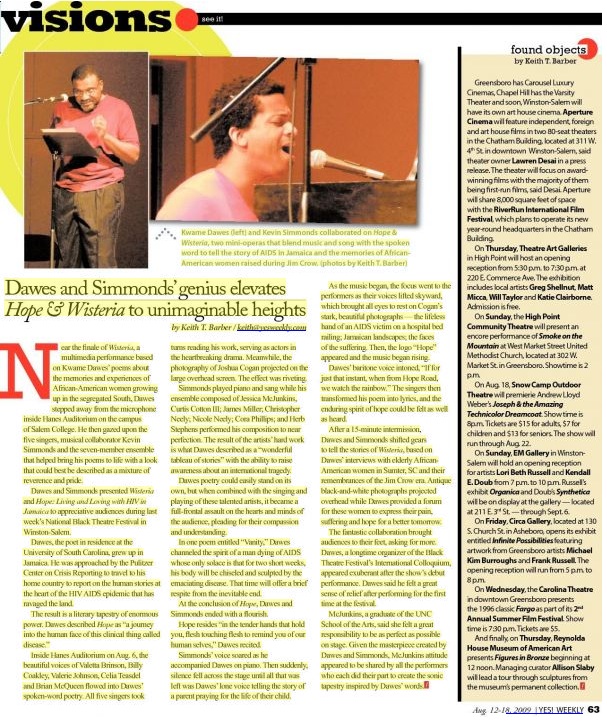
Near the finale of Wisteria, a multimedia performance based on Kwame Dawes' poems about the memories and experiences of African-American women growing up in the segregated South, Dawes stepped away from the microphone inside Hanes Auditorium on the campus of Salem College. He then gazed upon the five singers, musical collaborator Kevin Simmonds and the seven-member ensemble that helped bring his poems to life with a look that could best be described as a mixture of reverence and pride.
Dawes and Simmonds presented Wisteria and Hope: Living and Loving with HIV in Jamaica to appreciative audiences during last week's National Black Theatre Festival in Winston-Salem.
Dawes, the poet in residence at the University of South Carolina, grew up in Jamaica. He was approached by the Pulitzer Center on Crisis Reporting to travel to his home country to report on the human stories at the heart of the HIV AIDS epidemic that has ravaged the land. The result is a literary tapestry of enormous power. Dawes described Hope as "a journey into the human face of this clinical thing called disease."
Inside Hanes Auditorium on Aug. 6, the beautiful voices of Valetta Brinson, Billy Coakley, Valerie Johnson, Celia Teasdel and Brian McQueen flowed into Dawes' spoken-word poetry. All five singers took turns reading his work, serving as actors in the heartbreaking drama. Meanwhile, the photography of Joshua Cogan projected on the large overhead screen. The effect was riveting.
Simmonds played piano and sang while his ensemble composed of Jessica McJunkins, Curtis Cotton III; James Miller; Christopher Neely; Nicole Neely; Cora Phillips; and Herb Stephens performed his composition to near perfection. The result of the artists' hard work is what Dawes described as a "wonderful tableau of stories" with the ability to raise awareness about an international tragedy.
Dawes poetry could easily stand on its own, but when combined with the singing and playing of these talented artists, it became a full-frontal assault on the hearts and minds of the audience, pleading for their compassion and understanding.
In one poem entitled "Vanity," Dawes channeled the spirit of a man dying of AIDS whose only solace is that for two short weeks, his body will be chiseled and sculpted by the emaciating disease. That time will offer a brief respite from the inevitable end. At the conclusion of Hope, Dawes and Simmonds ended with a flourish.
Hope resides "in the tender hands that hold you, flesh touching flesh to remind you of our human selves," Dawes recited. Simmonds' voice soared as he accompanied Dawes on piano. Then suddenly, silence fell across the stage until all that was left was Dawes' lone voice telling the story of a parent praying for the life of their child.
As the music began, the focus went to the performers as their voices lifted skyward, which brought all eyes to rest on Cogan's stark, beautiful photographs — the lifeless hand of an AIDS victim on a hospital bed railing; Jamaican landscapes; the faces of the suffering. Then, the logo "Hope" appeared and the music began rising.
Dawes' baritone voice intoned, "If for just that instant, when from Hope Road, we watch the rainbow." The singers then transformed his poem into lyrics, and the enduring spirit of hope could be felt as well as heard.
After a 15-minute intermission, Dawes and Simmonds shifted gears to tell the stories of Wisteria, based on Dawes' interviews with elderly African- American women in Sumter, SC and their remembrances of the Jim Crow era. Antique black-and-white photographs projected overhead while Dawes provided a forum for these women to express their pain, suffering and hope for a better tomorrow.
The fantastic collaboration brought audiences to their feet, asking for more. Dawes, a longtime organizer of the Black Theatre Festival's International Colloquium, appeared exuberant after the show's debut performance. Dawes said he felt a great sense of relief after performing for the first time at the festival.
McJunkins, a graduate of the UNC School of the Arts, said she felt a great responsibility to be as perfect as possible on stage. Given the masterpiece created by Dawes and Simmonds, McJunkins attitude appeared to be shared by all the performers who each did their part to create the sonic tapestry inspired by Dawes' words.





